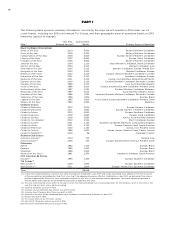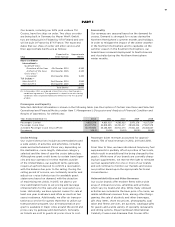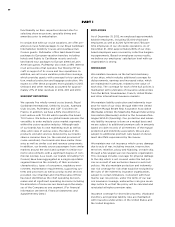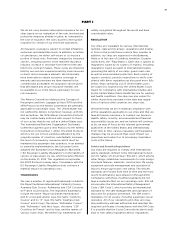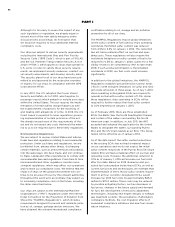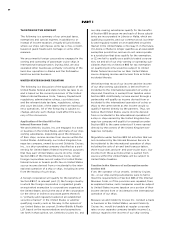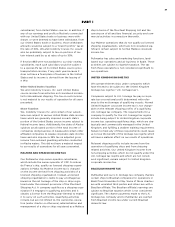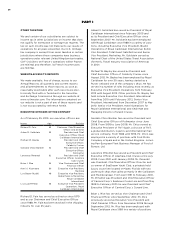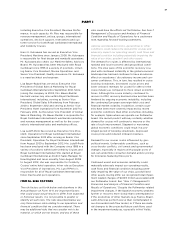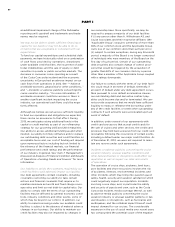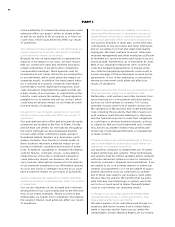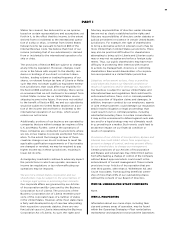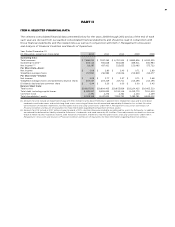Royal Caribbean Cruise Lines 2012 Annual Report Download - page 31
Download and view the complete annual report
Please find page 31 of the 2012 Royal Caribbean Cruise Lines annual report below. You can navigate through the pages in the report by either clicking on the pages listed below, or by using the keyword search tool below to find specific information within the annual report.
27
PART I
including Executive Vice President, Revenue Perfor-
mance. In such capacity, Mr. Rice was responsible for
revenue management, air/sea, groups, international
operations, decision support, reservations and cus-
tomer service for both Royal Caribbean International
and Celebrity Cruises.
Harri U. Kulovaara has served as Executive Vice
President, Maritime since January 2005. Mr. Kulovaara
is responsible for fleet design and newbuild operations.
Mr. Kulovaara also chairs our Maritime Safety Advisory
Board. Mr. Kulovaara has been employed with Royal
Caribbean since 1995 in a variety of positions, includ-
ing Senior Vice President, Marine Operations, and
Senior Vice President, Quality Assurance. Mr. Kulovaara
is a naval architect and engineer.
Lisa Bauer-Rudzki has served as Executive Vice
President of Global Sales & Marketing for Royal
Caribbean International since September 2012. Since
joining the company in 2002, Mrs. Bauer-Rudzki
has held various key roles within Royal Caribbean
International, including, serving as Senior Vice
President, Global Sales & Marketing from February
2012 to September 2012 and serving as Senior Vice
President, Hotel Operations from November 2007 to
February 2012. As Executive Vice President of Global
Sales & Marketing, Ms. Bauer-Rudzki is responsible for
Royal Caribbean International’s worldwide marketing
and revenue management as well as for the corpo-
ration’s international sales and marketing offices.
Lisa Lutoff-Perlo has served as Executive Vice Pres-
ident, Operations for Royal Caribbean International
since September 2012 after serving as Senior Vice
President, Operations for Royal Caribbean International
from August 2012 to September 2012. Mrs. Lutoff-Perlo
has been employed with the Company since 1985 in a
variety of positions within both Celebrity Cruises and
Royal Caribbean International. She started at Royal
Caribbean International as District Sales Manager for
New England and more recently, from August 2008
to August 2012, she was responsible for Celebrity
Cruises’ entire hotel operation. In her role as Executive
Vice President of Operations, Ms. Lutoff-Perlo is
responsible for all of Royal Caribbean International’s
hotel, marine and port operations.
ITEM 1A. RISK FACTORS
The risk factors set forth below and elsewhere in this
Annual Report on Form 10-K are important factors
that could cause actual results to differ from expected
or historical results. It is not possible to predict or
identify all such risks. The risks described below are
only those known risks relating to our operations and
financial condition that we consider material. There
may be additional risks that we consider not to be
material, or which are not known, and any of these
risks could have the effects set forth below. See Item 7.
Management’s Discussion and Analysis of Financial
Condition and Results of Operations for a cautionary
note regarding forward-looking statements.
Adverse worldwide economic, geopolitical or other
conditions could reduce the demand for cruises and
adversely impact our operating results, cash flows and
financial condition including potentially impairing the
value of our ships, goodwill and other assets.
The demand for cruises is affected by international,
national and local economic and geopolitical condi-
tions. The slow pace of the economic recovery cou-
pled with continued instability in the global economic
landscape has had and continues to have an adverse
effect on vacationers’ discretionary income and con-
sumer confidence. This, in turn, has resulted in cruise
booking slowdowns, decreased cruise prices and
lower onboard revenues for us and for others in the
cruise industry as compared to more robust economic
times. Although the cruise industry continued to
recover in 2012, recovery has been slow and has been
hindered by ongoing economic instability, including
the continuing European sovereign debt crisis and
financial market volatility. In addition, certain coun-
tries have been more severely impacted by recent
economic conditions than other economies including,
for example, Spain where we operate our Pullmantur
brand. We cannot predict with any certainty whether
demand for cruises will continue to improve or the
rate of such improvement. Stagnant or worsening
global economic conditions could result in a pro-
longed period of booking slowdowns, depressed
cruise prices and reduced onboard revenues.
Demand for our cruises is also influenced by geo-
political events. Unfavorable conditions, such as
cross-border conflicts, civil unrest and governmental
changes, especially in regions with popular ports of
call, can undermine consumer demand and/or pricing
for itineraries featuring these ports.
Continued unrest and economic instability could
materially adversely impact our operating results,
cash flows and financial condition including poten-
tially impairing the value of our ships, goodwill and
other assets. During 2012, we recognized total impair-
ment related charges of $413.9 million associated with
our Pullmantur brand. See “Item 7. Management’s
Discussion and Analysis of Financial Condition and
Results of Operations.” Despite the Pullmantur related
impairment charges, if the Spanish economy weakens
further or recovers more slowly than contemplated or
if the economies of other markets (e.g. France, Brazil,
Latin America) perform worse than contemplated in
our discounted cash flow model, or if there are mate-
rial changes to the projected future cash flows used
in the impairment analyses, especially in Net Yields,



